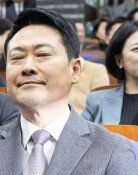High School Students Compete For Grades
High School Students Compete For Grades
Posted March. 23, 2005 22:34,
High school freshmen (10th graders) are set to experience a fresh private tutoring craze due to changes in the college entrance system that focuses more on school grades, including a change from absolute to relative grading.
Policies for 2008 and beyond aiming to enhance public education by focusing more on school grades have been announced, but private tutoring is on the rise, leading to speculation that the authorities have again missed the mark.
The education team at Dong-a Ilbo conducted a survey of 856 students in seven middle schools and high schools in the Gangnam, Nowon, Yangcheon, and Jongno districts of Seoul which yielded in an increase in attendance at private institutes.
For high school freshmen, 54.2 percent attended classes in Korean, English, and mathematics in these institutes, an increase of 13.5 percentage points from middle school students (40.7 percent).
The increasing importance of essays in the college entry process caused an increase of private tutoring in Korean from 43.2 percent to 59.5 percent, an increase of 16.3 percentage points.
Ninth graders also showed an increase in private tutoring in the three subjects to 56.5 percent, 6.1 percentage points higher than last year.
A total of 94.7 percent of high school freshmen expressed dissatisfaction in the focus on school grades, showing the heavy psychological burden on the students.
Reflecting this atmosphere, some high schools saw an increase in parents visiting schools, while lectures in private institutes that manage school grades are on the rise.
At parent-teacher conferences held at Joongdong High School in Ilwon-dong, Gangnam-gu, Seoul on March 16, 350 parents attended the meeting, up from the low turnout of 200 last year. Less than half of the schools 450 students are in the 10th grade.
Vice principal Kim Chun-gwang of Joongdong High School stated, We tried to explain the years academic schedule, assessment and student activities, but the parents were only interested in whether the exams will be harder.
One parent of a high school freshman living in Gangnam, Seoul said If my child doesnt receive Tier 1 school grades, well have to kiss the prestigious colleges goodbye, and that if more than eight percent of kids rank first in a subject, only half of the students will be acknowledged by universities, making the system unpredictable.
Park Beom-soo, a teacher at Sehwa Girls High School in Seocho, Seoul, said, After the importance of school grades became inflated, it has become more difficult to achieve Tier 1 status, increasing parental doubts in the system, and that this type of unified assessment that does not take school levels into consideration should be amended.
The renewed focus on school grades is also reviving private institutes. Academies that specialize in certain subjects are altering their direction to teach an entire range of subjects, and are changing classes that combine the teaching trends of six to eight high schools in the district, as well as inviting renowned lecturers.
Academies collect question banks and lecture notes from high schools, analyzing teacher trends in writing up exams, and provide students with CDs that contain question pools for the examinations.
Private tutoring has also extended to the arts and physical education, where there is also tutoring for vaulting.
One principal of a private institute located in Gangnam, Seoul, said, Due to the change in the college entrance exams, there were many academies teaching minor subjects that were kicked out of the market, but the stronger focus on school grades now is opening up new venues for us, and that the college entrance policy for 2008 is not bad for private institutes at all.
In-Chul Lee Na-Yeon Lee inchul@donga.com larosa@donga.com







